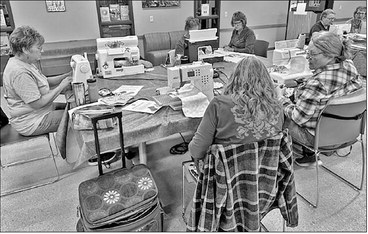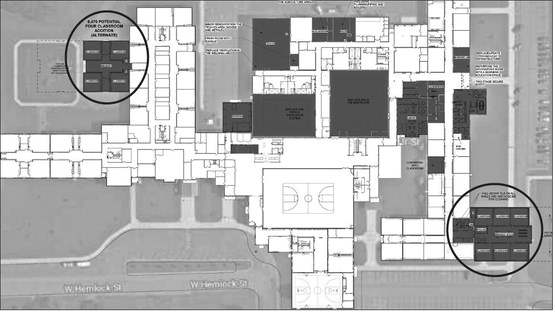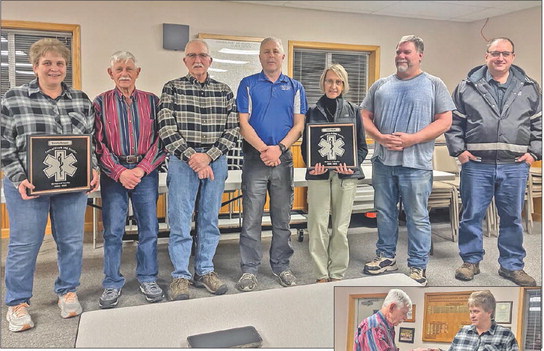From Ukraine to Unity: Escaping the war on Ukraine
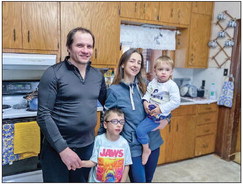

The Hnatiuks had lived in Ukraine their whole lives. Their once peaceful home had been anything but over the last year. Although their hometown of Lviv is not located in the eastern part of the country where a majority of the fighting has been taking place, the Hnatiuk family made the tough decision to leave family, friends and their entire lives behind.
Leaving home
Mykola and Olesia Hnatiuk made the decision to leave their home in part because Mykola’s brother was killed during the war. Their two kids, Roman, 6 years old, and Dmytro, 3 years old, were at risk of growing up in a world full of conflict and war. The Hnatiuks said they knew they needed to get out of the country if they wanted their children to be able to learn and grow in a safe environment. They would need to flee the country.
The city of Lviv is considered the culture capital of Ukraine. It is the sixth-largest city in Ukraine with a 2022 estimated population of 717,000.
It was fall of 2022 when they decided to leave the country they loved for a new beginning. Although Mykola might have otherwise been required to stay in the country to potentially serve in the military, he was allowed to leave because of his brother’s death in the war.
Olesia said making the decision to leave was not one that was made lightly as they had to leave everything they had known up until that point, for a new life.
“It was very hard. It was a hard decision because you leave all your life, all your relatives, all your friends, all your stuff. Everything you have, you leave,” Olesia said.
Olesia said she did not want her kids growing up around rockets, drones and the carnage that war brought upon her area.
“If we stayed there, our children would have no chance to grow, have an education, or have a childhood. No chance,” Olesia said. “We were looking for a place for our children to be safe,” Mykola reiterated.
She said her city of Lviv only allowed its residents to use electricity for four hours out of the day. She said no one knew when the power would be coming on but when it did, she had to rush home from whatever she was doing in order to do laundry, computer work, charge phones and anything else they would need for the next blackout period.
Although the front line of the war was not close to Lviv, Bryce said missile strikes were a regular occurrence in or near the city. During her interview with the Tribune-Phonograph, Olesia said her hometown was being attacked by a drone strike as she spoke on March 17.
“All of my family is over there,” Olesia said. “It’s a pain to see this.”
Bryce said not only had Mykola’s brother perished as a soldier in the war, but he also had another family member that had both legs amputated as a result of the war. He said the Russian missile strikes have been recklessly endangering civilian life and that was part of his motivation for helping get families that have the opportunity to leave, out of the country.
Lviv is close to the Ukraine-Poland border so the Hnatiuks used a bus to get into Poland. From there, they flew to Lisbon, Portugal and then took a flight to Chicago where they met their host family, Bryce and Max Luchterhand.
Adjusting to life in a new country and a new culture has not been easy for the Hnatiuks.
Going from the sixth-largest city in Ukraine to a rural area was one of the adjustments that the Hnatiuks would have to make during the relocation process.
“We gave them one last chance to back out,” Bryce said. “I said, ‘Understand that we’re going to be next door neighbors and you’re going to be in a very rural part of the state of Wisconsin. Do you still want to come?’” Although their hometown contained a plethora of museums, theaters and was over 1,200 years old, the Hnatiuks said they didn’t mind coming to a rural area because it was more about the people they were going to be staying with.
“When we read about Bryce and Max, [we saw] they had four children and 10 grandchildren, and we decided that if they live in a rural area, it doesn’t matter where we would live,” Olesia said. “We chose good people.”
The family brought themselves and five or six suitcases because that’s all they could carry. Their clothes, furniture, shoes, food and much more were left behind.
Both Mykola and Olesia worked for an insurance company in Lviv. Mykola worked as a salesman while Olesia handled the accounting and account management for the company. Mykola has a master’s degree in math and economics and also served as a math teacher in Ukraine. Olesia has degrees in auditing and accounting.
They said although they would have loved to get a job providing insurance in the U.S., they know that selling insurance is a game of connecting and networking with people in order to build relationships. Relationships that they do not have here in the U.S. as of yet. They also said there was a language barrier that might make it difficult to work in insurance.
Currently, Mykola works in the maintenance department of the Abbyland Pork Pack plant in Curtiss.
He said it has been challenging but he is grateful for the opportunity to work and make money.
The Hnatiuk’s six-year-old, Roman, is enrolled in kindergarten at Colby Elementary.
Despite the adjustments, Olesia said she was grateful for the opportunity to live a semi-normal life here in the U.S.
“In Ukraine, we couldn’t plan anything,” Olesia said. “Nothing depended on us. It all depends on a decision made by someone in Russia. Here, we have a normal life.”
When Bryce and Max Luchterhand saw coverage of the invasion of Ukraine by Russia, they knew there were going to be a lot of people that would need help. They decided they needed to do something to provide aid to the people of Ukraine. The Luchterhands decided to explore options through United for Ukraine. There, they found a program called Welcome Connect which connected Ukraine families to potential hosts in other countries.
“We knew watching from here that everyone’s lives were getting turned upside down,” Bryce said. “We saw 6 million Ukranians get displaced from their homes and we thought, ‘We must be able to do something to help someone.’” When Bryce and Max signed up, a rule was in place that said that if a Ukranian family wanted to come to the U.S. they needed to have a family member in the U.S. that would sponsor them. Despite the rule, the program filled up very quickly with families according to Bryce.
Bryce said the Luchterhands continued to watch to see if a way they could help would present itself. Then in December 2022, Bryce found a news article about Welcome Connect and he signed the Luchterhands up for the program.
From there, it wasn’t long and the Luchterhands had received a host of matches. The host family was able to build a profile and match with the Hnatiuks as well as a few other families. After the profile was live for an hour, the Luchterhands already had three families that were interested.
After messaging back and forth for a bit and learning more about Olesia, Mykola and the kids, the Luchterhands knew they would be a perfect match.
The approval process happened quicker than the Luchterhands had anticipated. They said a normal connection between families would take 3-5 months, but the Luchterhands and Hnatiuks had connected in a matter of days.
“These two people are just wonderful,” Max said. “They are very frugal. They are teaching us so much about Ukraine. Mykola has been extremely helpful. He likes to be outside helping Bryce with things.”
Bryce and Max live on a small farm about five miles west of Unity. They live in a house on the property but they had a second home that used to be inhabited by Bryce’s mother until she died in October of 2021. It was the house that Bryce grew up in so to see it used for a good cause was and is a rewarding experience for him.
Although the home was kept up well and fully furnished, things like a car, cell phone, health insurance and internet were all provided by Bryce and Max.
Max said although she and Bryce are helping the Hnatiuks, she said the Luchterhands are learning so much from the family.
“We have been helping Mykola and Olesia, but we have been getting so much out of it ourselves,” Max said. “I feel like we have another daughter and son. I really do. Our children are about the same age so it’s been really easy to just add two more.”
The two families have enjoyed tapping maple trees on occasion this spring and Mykola will look to continue his beekeeping hobby at the Luchterhands farm during the summer.
The Hnatiuks said their stay in the U.S. is only temporary as the family has humanitarian parole for two years. Bryce said with the uncertainty of how long the war might last, the Hnatiuks could pursue a visa for a longer stay but they said they will wait to see what happens with the war first.
The Luchterhands still have a Go-FundMe available for those that wish to donate money to help pay for expenses related to helping the family. That can be found at https://gofund. me/4de2f2d4 or by searching “Luchterhand” on the GoFundMe website.
Initially, Bryce said he and Max had planned on doing this alone, but he said after people had heard about the work they were doing and the financial commitment the Luchterhands were making, people wanted to help.
“We set up a GoFundMe page and the response has been really amazing,” Bryce said. “The people in the area have really been generous and supportive. It’s really been heartwarming.”
Bryce said he would absolutely recommend those that have the means of helping Ukrainians in any sort of facet, to do so. He said Welcome Connect was a terrific resource for those hoping to host a family from Ukraine.
“We would certainly recommend that people go to Welcome Connect if they are interested in sponsoring a family themselves,” Bryce said. “They explain a lot of stuff. There’s a lot of information on that website. It’s very easy to understand and very easy to follow through.”
Olesia said at the time of the interview, there were 500 Ukranians waiting for placement through the program and not enough host families.
“There’s a desperate need [for host families] and not enough Americans are stepping forward to volunteer,” Bryce said.
Bryce and Max said they entered the program not knowing what would come of it.
“We didn’t know what we were doing,” Bryce said. “We’ve had people tell us, ‘Well, you could do it because you knew what you were doing.’ That’s not the case. There’s enough support that it’s not difficult to do.”
He said he and Max are good resources if people would like more information about how the process of becoming a host family works.
You can check out more about Welcome Connect and the United for Ukraine at welcome.us.
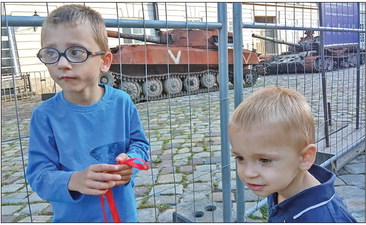
GROWING UP WITH WAR -Roman (left) and Dmytro Hnatiuk (right) stand by the side of the street as tanks roll past in Lviv. The Hnatiuks relocated in part to help their two children grow up out of danger.SUBMITTED PHOTO
